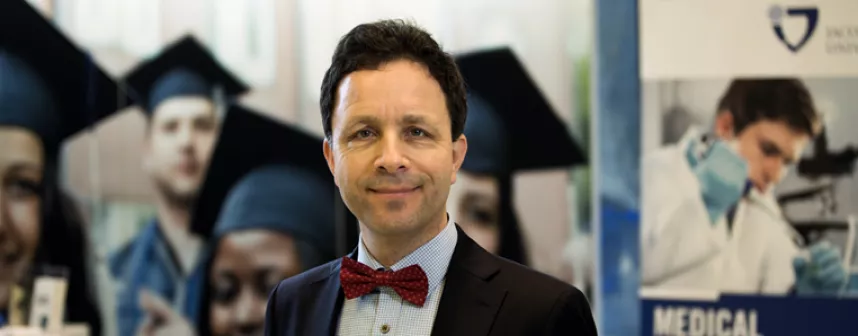Inspiring students to love science
August 23, 2018
Of course, he was surprised. After all, no former student had ever donated 50,000 euros to his or her professor at Jacobs University Bremen. “This was an unbelievably momentous occasion for me,” says Sebastian Springer. A few years ago, the biochemist had seen potential in an applicant from far-away Yemen that no-one else saw. Other universities and colleges had rejected Hashem Al-Ghaili’s application. But not Springer, who awarded him a place to study at Jacobs University. Al-Ghaili, who was to later become a science communicator with 27 million Facebook followers, expressed his gratefulness in the form of a donation. Springer has invested the funds in cancer research equipment.
“Potential” is an important concept for the 52-year old scientist. Developing the abilities of each and every one of his students, motivating and giving them the tools they need to succeed is his passion. “The greatest reward for me in teaching is when a student says: Wow - I never thought I could achieve that.”
Springer teaches students from all over the world. They are frequently highly talented and extremely motivated, and come from a variety of learning cultures. Bringing them together and promoting teamwork - that is an important initial task. The groups are small and Springer knows each person - the contact with students is very intensive. He always imparts skills using concrete examples; he records each of his lectures and makes them available to the students. The level is as high as the demands "We train top students and give them the very best career opportunities.”
Being ambitious in his academic goals, with the objective of delivering the best possible quality to be able to keep up with the best internationally in his scientific endeavors - that is important to Springer. Before joining the International University Bremen in the year of its establishment in 2001, which later became Jacobs University, he worked with future Nobel Laureate Randy Schekman at the University of California at Berkeley for five years. "This was an environment in which we were always encouraged to set ourselves the highest possible goals and achieve the very best results. It didn’t happen because of pressure from above, but because of an atmosphere of mutual encouragement among colleagues.”
He tries to apply this philosophy to his own research group, which consists of doctoral students, post-docs, a technician and student assistants. Springer is an enthusiastic basic researcher who wants to discover something new. His enjoyment of research stems from his curiosity and fascination with nature, and he passes on this enthusiasm to his students who are involved in research at a very early stage and often achieve outstanding results. "How cells, the organism and the immune system interact is simply beautiful," says Springer. “I feel very privileged to be able to work on this.”
How does a cell organize its components at the right places? Why does a protein look like this and not differently? The seemingly naive question of “why” is always at the beginning of his research, says Springer. This can give rise to something concrete. Together with his team, Springer has developed a new method for the production of diagnostic reagents that simplify the treatment of cancer. This research project took fourteen years, the result of which has been patented and is now to lead to the foundation of a company. "Hopefully we can use it to financially give back to Jacobs University, which has, after all, invested in our work.”
Springer is a lecturer, researcher - and now also an official. The father of two children, whose wife is headmistress of a Bremen high school, is a spokesperson representing the interests of the professors in the Academic Senate, the university's highest decision-making body in academic matters, at Jacobs University. For him, this is a new, exciting experience contributing to the further development of the university. He wants to support the introduction of new Master's programs in the life sciences. What is needed here are skills that tend to play a subordinate role in his everyday scientific work: the balancing of interests, for example, and the finding of compromises. There is no doubt that Sebastian Springer will also master this task.
For more information:
http://springergroup.user.jacobs-university.de/
https://www.jacobs-university.de/study/undergraduate/programs/biochemistry-and-cell-biology
